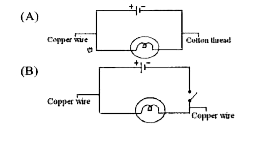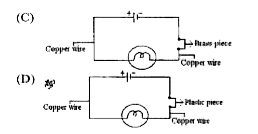Three incandecent bulbs of 100W each are connected in series in an electric circuit. In another circuit another set of three bulbs of the same wattage are connected in parallel to the same source.
(a) Will the bulbs in the two circuits glow with the same brightness ? Justify your answer.
(b) Now let one bulb in both the circuits get fused. Will the rest of the bulbs continue to glow in each circuit ? Give reason.
(a) No, the bulbs in parallel combination glow more brightly. This is clear from the following discussion. If R is the resistance of each bulb and V is the voltage of the source, current through each bulb (in series combination, Is=V3R
Total current through all the bulbs (in parallel combination),
I=VR/3=3VR (total resistance of 3 bulbs in parallel is R/3)
Current through each bulb (in parallel combination), Ip=I/3=3V/R3=VR
Clearly, Ip=3Is, The glow of a bulb is due to Joule heating (I2R).
(b) (i) When one of the bulbs in series circuit gets fused, the circuit is broken. Since no current passes through the bulbs, they stop glowing.
(ii) When one of the bulbs in the parallel circuit, gets fused, the other two bulbs keep glowing with the same brightness as their circuits are not broken.
Topper's Solved these Questions
- ELECTRICITYBook:PRADEEPChapter:ELECTRICITYExercise:(Additional)Very Short Answer
Explore 47 Videos
- ELECTRICITYBook:PRADEEPChapter:ELECTRICITYExercise:(Additional)Short Answer
Explore 36 Videos
- ELECTRICITYBook:PRADEEPChapter:ELECTRICITYExercise:(Exemplar)Short Answer
Explore 10 Videos
- MAGNETIC EFFECTS OF ELECTRIC CURRENTBook:PRADEEPChapter:MAGNETIC EFFECTS OF ELECTRIC CURRENTExercise:Mock Test
Explore 21 Videos
Similar Questions
Three incandescent bulbs of 100 W each are connected in series in an electrical circuit. In another circuit another set of three bulbs of the same wattage are connected in parallel to the same source.
(a) Will the bulb in the two circuits glow with the same brightness? Justify your answer.
(b) Now let one bulb in both the circuits get fused. Will the rest of the bulbs continue to glow in each circuit? Give reason.
View SolutionThree incandescent bulbs of 100W each are connected in series in an electric circuit. In another circuit, another set of three bulbs of the same wattage are connected in parallel to the same source.
(a) Will the bulbs in the two circuits glow with the same brightness ? Justify your answer.
(b) Now let one bulb in both circuits get fused. Will the rest of the bulbs continue to glow in each circuit ? Give reason.
(a) In a household electric circuits, different appliances are connected in parallel to one another. Give two reasons for the same.
(b) An electrican puts a fuse of rating 5A in that part of domestic electrical circuit in which electrical heater of rating 1.5kW,220V is operating. What iis likely to happen in this case and why ? What change, if any, needs to be made ?
View Solution
Knowledge Check
Two electric bulbs A and B are rated as 60 W and 100 W . They are connected in parallel to the same source. Then,
ABoth draw the same currentBA draws more current than BCB draws more current than ADCurrent drawn are in the ratio of their resistancesTwo electric bulbs A and B are rated as 60 W and 100 W . They are connected in parallel to the same source. Then,
AB draws more current than ABCurrent draws are in the ratio of their resistacesCBoth draw the same currentDA draws more current than B.Three electric bulbs of rating 60 W each are joined in series and then connected to electric mains. The power consumed by these three bulbs will be
A180 WB60 WC20 WD203W
Bulb in this circuit doesn't glow, why?

View SolutionIn which case, bulb glows in the circuit.


View SolutionThree bulbs of 40, 60 and 100 watt are connected in series with the source of 200 volt. Then which of the bulb will be glowing the most –
View SolutionTwo electric bulbs AandB are rated 60and100W, respectively. If they are connected in parallel to the same source , then
View SolutionIn which of these circuits will the bulb glow?
View Solution